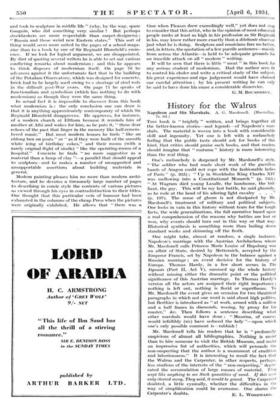History for the Walrus
Tins book is " brightly " written, and brings together all the better-known stories—and legends—of Napoleon's mar- shals. The material is woven into a book with considerable skill and ingenuity. Yet one is left with a melancholy feeling that the public taste should ask for books of this kind, that critics should praise such books, and that readers should imagine that " costume " history is more interesting than the real thing.
One's melanctioly is deepened by Mr. Macdonell's style. " The soldier who had made short work of the guerillero bands of Aragon could not cope with the fashionable ladies of Paris " (p. 335) ; " Up in Stockholm King Charles XIV was mellowing into a Constitutional Monarch " (p. E42) ;
At Wagram died young Lasalle, the handsome, the bril- liant, the gay. This will be my last battle, he said gloomily, as he rode at the head of his adoring light cavalry . . . " (p. 197). The sense of gloom is not dissipated by Mr. Maedonell's treatment of military and political subjects. One looks in vain in this history without tears for the tough facts, the wide generalizations, the full narrative based upon a real comprehension of the reasons why battles are lost or won, why events should turn out in this way or that way. Historical synthesis is something more than boiling down standard works and skimming off the froth.
One might take, almost at random, a single instance. Napoleon's marriage with the Austrian Archduchess whom Mr. Macdonell calls Princess Marie Louise of Hapsburg was an affair of State, desired by Metternich, accepted by the Emperor Francis, set by Napoleon in the balance against a Russian marriage ; an event decisive for the history of Europe. Thomas Hardy, in a few short scenes in The Dynasts (Part II, Act V), summed up the whole history without missing either the dramatic point or the political significance of this Austrian marriage. In Thomas Hardy's version all the actors arc assigned their right importance ; nothing is left out, nothing is florid or superfluous. To Mr. Macdonell the event gives an occasion for two theatrical paragraphs in which not one word is said about high politics, but Berthier is introduced as " at work, armed with a million and a half francs in diamonds, wooing, by proxy for his master," &c. Then follows a sentence describing what other marshals would have done : " Massena, of course, would infallibly (sic) have seduced the lady "—upon which one's only possible comment is—rubbish !
Mr. Macdonell tells his readers that he is " profoundly suspicious of almost all bibliographies. Nothing is easier than to hire someone to visit the British Museum, and make an impressive list of authorities, which will persuade the non-suspecting that the author is a monument of erudition and laboriousness." It is interesting to recall the fact that the Walrus and the Carpenter, in other respects, perhaps, less studious of the interests of the " non-suspecting," depre- cated the accumulation of large masses of material. They wept like anything to see Such quantities of sand. if this were
only cleared away, They said, it would be grand. The Carpenter doubted, a little cynically, whether the difficulties in the way of simplification could be overcome. One shares the








































 Previous page
Previous page